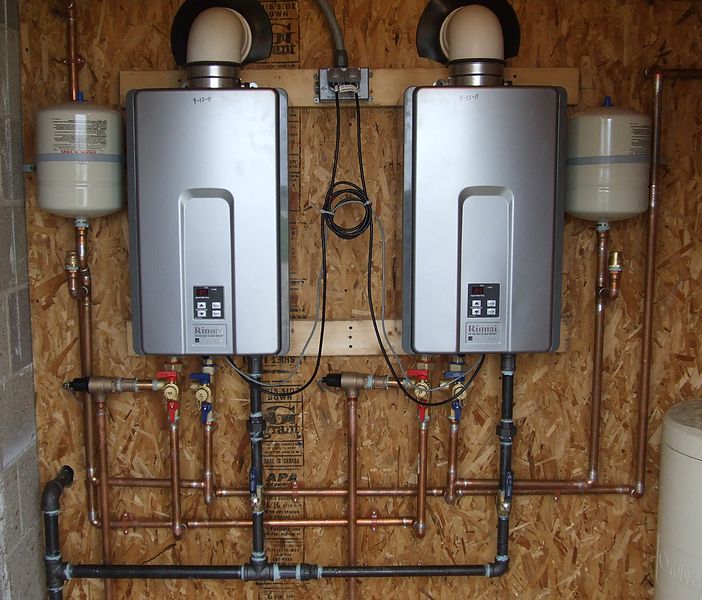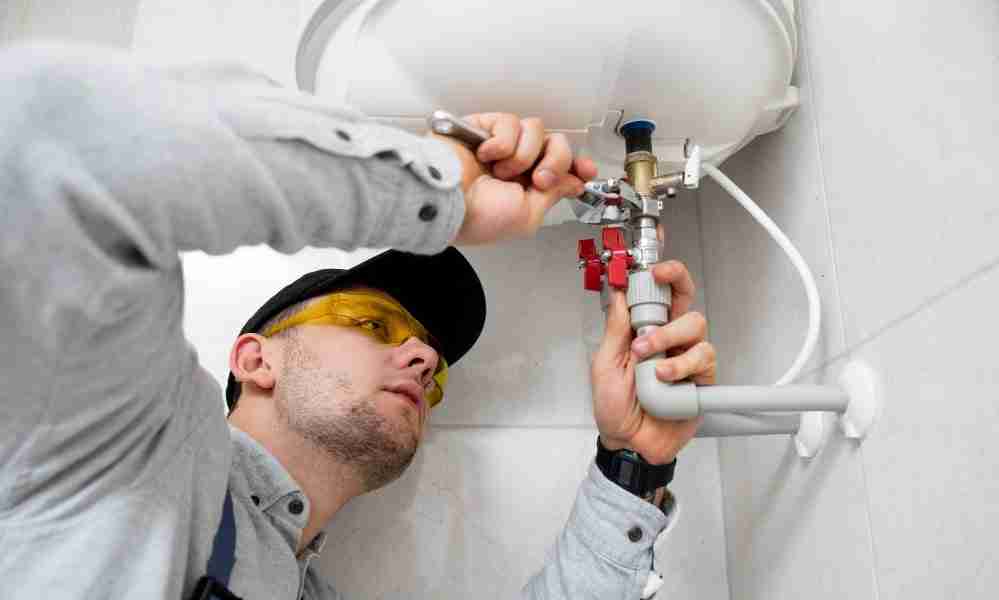Enhancing Household Convenience: The Benefits Of Tankless Water Heaters
Enhancing Household Convenience: The Benefits Of Tankless Water Heaters
Blog Article
The author is making several good annotation regarding 5 Benefits of Tankless Water Heaters in general in this post on the next paragraphs.

In a globe where ease and efficiency reign supreme, it's no surprise that property owners are regularly looking for smarter methods to handle their home's power usage and convenience. One development that has progressively obtained appeal is the tankless water heater. However what exactly makes these systems attract attention from the standard tank-based designs most of us grew up with? Allow's dive in and check out the advantages of tankless hot water heater, aiding you decide if it's time to make the button in your house.
Intro
Image this: you enter the shower after a lengthy day, expecting a soothing cascade of warm water, only to be greeted by icy droplets due to the fact that the last person utilized it all up. Sound acquainted? Standard hot water heater keep a fixed amount of warm water, meaning you go to the grace of that container's supply. Tankless systems, on the other hand, warmth water as needed. No more going out mid-shower, no more fumbling with schedules simply to make sure hot water is offered.
Understanding Tankless Water Heaters
What Are Tankless Hot Water Heater?
Tankless water heaters, often referred to as on-demand or instantaneous water heaters, provide hot water just as it's required. As opposed to saving gallons of pre-heated water, these units kick into activity the moment you activate the faucet. Water travels through a heat exchanger, warming up in real-time, implying you get a nonstop circulation of hot water without the demand for a large container sitting idly by.
Just how Do They Vary from Traditional Equipments?
Standard heaters hold a storage tank of warm water, using energy to maintain that storage tank at a regular temperature. Tankless systems get rid of the standing supply, cutting down on wasted power and the bulky footprint of a large cylinder. Essentially, you're updating from a "stockpile" mindset to a "made-to-order" technique.
Typical Kinds Of Tankless Devices
Tankless water heaters normally can be found in two selections: gas and electric. Gas versions often tend to provide greater circulation rates, ideal for larger households, while electric versions often offer smaller sized homes and are generally much easier to mount. Additionally, some systems are made for point-of-use (offering one fixture) while others can manage the entire home's warm water requirements.
Trick Benefits of Tankless Water Heaters
1. Unlimited Hot Water Supply
Ever before needed to arrange showers so everyone gets their fair share of hot water? With tankless, that comes to be a thing of the past. As long as the heating unit's flow capability isn't surpassed, you can take back-to-back showers without developing into a popsicle.
2. Power Efficiency and Expense Cost Savings
No more warming a titan container's worth of water and maintaining it cozy all the time. Tankless heating units minimize standby energy losses, which can lower energy bills. While the first cost could be greater, the long-lasting financial savings usually justify the financial investment.
3. Space-Saving Design
If your home is short on storage, getting rid of the cumbersome storage tank maximizes useful room. Tankless devices are compact and can commonly be mounted on wall surfaces, concealed in edges, or mounted in tight utility storage rooms without hogging the entire room.
4. Longer Lifespan
A well-kept tankless hot water heater can outlive its tank-based cousin. Traditional storage tanks might last 10-15 years, while tankless versions can keep downing along for twenty years or more, making them a solid investment with time.
5. Improved Water Top Quality
Storing water in a container can occasionally result in sediment build-up or a somewhat "off" preference. With tankless systems, fresh water is heated instantly, lowering the chances of debris accumulation and possibly offering cleaner-tasting water.
Factors to consider Before Switching
Though the advantages are compelling, it's wise to take into consideration a few elements before fully committing.
Preliminary Investment Costs
Tankless heaters commonly include a higher ahead of time cost. Between the system itself and potential setup modifications, the first expense might offer you sticker shock. But remember to watch it as a long-lasting investment.
Setup Demands
Depending upon your home's infrastructure, you might require additional electrical capability or gas line upgrades. Guarantee you recognize the installment requirements and seek advice from a specialist to avoid shocks.
Assessing Your Home's Water Usage Patterns
If your household at the same time utilizes numerous fixtures with high warm water need, make certain the unit's circulation price fulfills your needs. Recognizing your usage patterns helps you pick the right size and kind of tankless heater.
Maintenance and Care Tips
Tankless systems are reasonably low upkeep, but they aren't set-it-and-forget-it home appliances.
Regular Cleansing and Descaling
Tough water minerals can accumulate in the heat exchanger, influencing performance. Regular descaling (commonly advised every year) keeps the system running at peak performance.
Annual Expert Inspections
A yearly checkup from an expert guarantees minor issues are caught early. They'll examine the unit's efficiency, search for leaks, and help preserve optimum efficiency.
Ensuring Proper Air Flow
For gas designs, appropriate air flow is necessary to securely get rid of exhaust gases. Ensure venting systems are tidy and correctly mounted to prevent any type of potential security hazards.
Comparing Different Brands and Designs
Not all tankless hot water heater are created equal.
Looking Into Trustworthy Suppliers
Look for reputable brands with a history of creating quality units. A trustworthy maker usually gives far better client assistance and longer service warranties.
Checking Out Reviews and Individual Feedback
Individual testimonials and feedback from next-door neighbors or buddies that have actually gone tankless can provide valuable understandings. In some cases, real-life experiences can be a lot more informing than advertising and marketing pamphlets.
Installment: DIY or Expert?
While some property owners enjoy tackling jobs themselves, tankless setup could not be the most effective time to break out the tool kit.
Pros and Cons of DIY Installment
A do it yourself install might conserve cash, however it features risks. Wrong installment can cause inadequacy or safety and security concerns. If you come in handy and have experience, it may be practical-- but wage caution.
When to Call a Specialist Plumbing
For a lot of, calling a pro ensures everything's done properly. A professional plumbing recognizes local codes, sizing demands, and airing vent criteria, lowering the danger of mishaps.
Making the most of Performance
You have actually bought a tankless device-- now optimize its efficiency.
Optimum Temperature Settings
Most people establish their units in between 120-140 F. Changing the temperature level can improve convenience and financial savings. Experiment to locate a sweet area that does not throw away energy.
Pairing with Low-Flow Fixtures
Want to stretch your device's capacities? Consider installing low-flow showerheads and taps. They minimize water use, permitting your tankless system to deliver a constant stream of warm water without stressing.
Environmental Impact
Tankless water heaters align with greener living objectives.
Lowered Carbon Footprint
By utilizing much less energy and only heating water as required, tankless systems can lower your home's carbon footprint, minimizing your ecological impact.
Conserving Natural Resources
Much less power usage and much less lost hot water convert into less natural resources being used, an ecological win-win.
Who Benefits The Majority Of from Tankless Heating units?
The beauty of tankless heating systems is that they can suit a range of houses.
Huge Family Members vs. Solitary Passengers
Large households might love the limitless warm water supply, while single passengers appreciate the energy savings from not heating a whole tank for simply someone's early morning shower.
House Owners with Minimal Room
If your home is short on square footage, shedding the cumbersome tank liberates area for other essentials-- or maybe just much more breathing space.
Eco-Conscious Consumers
Going tankless aligns with environmentally friendly worths, guaranteeing you're not throwing away energy or resources.
Future Fads in Tankless Hot Water Heater
The globe of home devices is ever-evolving, and tankless water heaters are no exception.
Smart Home Integration
Envision changing your hot water heater's temperature level using an app or getting maintenance notifies on your phone. As clever home tech developments, we'll see even more connectivity and benefit.
Advancements in Innovation
R&D is continuously improving heat exchangers, making devices a lot more reliable and durable. Future designs could be even quieter, much more compact, and much better fit for differing climates.
Final thought
Picking a tankless water heater is greater than just updating your home's hot water system; it's buying lasting comfort, energy effectiveness, and a greener way of living. By considering your home's water use, being mindful of setup needs, and committing to normal upkeep, you can appreciate a constant stream of hot water without the baggage of a cumbersome container. As modern technology advances, you can expect even smarter, more effective tankless remedies that not just make your life easier however additionally benefit the world.
Pros and Cons of Tankless Water Heaters
Tankless Water Heater Pros
Saves Energy: Simply put, you re spending less energy to create hot water, so your total carbon footprint goes down, not to mention your bills. Lasts Longer Than Storage Tanks: Storage tank units need to be replaced every 15 years or so. But tankless units? They can last for 30 years before they give out on you. Constant Hot Water: Need to take a shower and don t want the water running cold? Awesome it won t. The water will stay hot the entire time because it creates hot water on demand. Saves You Money: Less water usage equals less money. Beyond that, you re not paying to keep water hot 24/7. Those savings add up quickly. Better for the Environment: Less water waste is better for everyone. It saves you money, but it s also environmentally conscious at the same time. Tankless Water Heater Cons
It Can Take a Minute: Depending on your specific unit and its placement, it can take anywhere from 10 seconds to 2 minutes to fully heat up. Because there s no storage tank, it heats water as you need it. Upfront Purchase Price: While we talked about their longevity, there s sticker shock when you look at brand-new tankless units to install. It pays for itself, but it s still a big chunk of change at first. Has its Limits: If you run multiple appliances at once, such as the dishwasher, washing machine, and maybe you take a shower at the same time, there might not be enough hot water. https://www.airsouthnow.com/blog/water-heater-service/pros-and-cons-of-tankless-water-heaters/

I found that piece of writing about Pros and Cons of Tankless Water Heater when doing a search on the search engines. I beg you pause to distribute this blog entry if you enjoyed it. Thank you for going through it.
Estimating Report this page